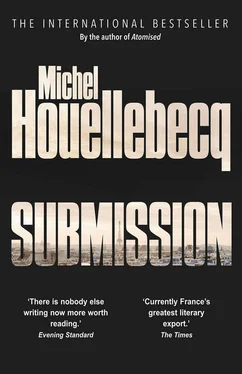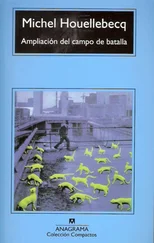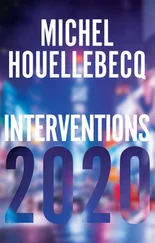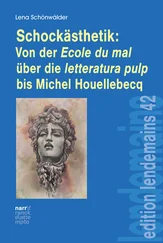‘Wait!’ He got up and went over to his desk. Behind it, the shelves were full of dictionaries and reference books. He came back with a small, illustrated paperback, inscribed to me, entitled Ten Questions on Islam .
‘Here I am, proselytising at you for three hours, when I’ve already written a book on the subject. I guess it’s become second nature … But maybe you’ve heard of it?’
‘Yes, it sold very well, didn’t it?’
‘Three million copies,’ he apologised. ‘I seem to have developed an unexpected knack for the middlebrow. It’s awfully schematic, of course …’ he apologised again. ‘But at least it’s a quick read.’
It was 128 pages long, with lots of pictures, mainly Islamic art. He was right, it wouldn’t take me too long. I put it in my backpack.
He poured us two more glasses of boukha . Outside the moon had risen high over the terraces of the arena, and now it outshone the street lights. I noticed that the verses from the Koran and the photographs of galaxies, hung amid the wall of vegetation, were lit by small individual lamps.
‘Your house is very beautiful …’
‘It took me years to get here. Believe me, it wasn’t easy.’
He shifted in his chair, and now, for the first time since I’d arrived, I had the feeling that he was actually unbending: he was about to speak from the heart: ‘Obviously, I have no interest in Paulhan — who could be interested in Paulhan? But it is a constant source of happiness to think that I live in the house where Dominique Aury wrote Story of O — or, at least, in the house of the lover she wrote it for. It’s a fascinating book, don’t you think?’
I completely agreed. In principle, Story of O contained everything I didn’t like in a novel: other people’s fantasies disgusted me, and the whole thing was so ostentatiously kitschy — the apartment on the Île Saint-Louis, the hôtel particulier in the Faubourg Saint-Germain, Sir Stephen , all that stuff was shit. All the same, the book had a passion, a vitality that swept everything before it.
‘It’s submission,’ Rediger murmured. ‘The shocking and simple idea, which had never been so forcefully expressed, that the summit of human happiness resides in the most absolute submission. I hesitate to discuss the idea with my fellow Muslims, who might consider it sacrilegious, but for me there’s a connection between woman’s submission to man, as it’s described in Story of O , and the Islamic idea of man’s submission to God. You see,’ he went on, ‘Islam accepts the world, and accepts it whole. It accepts the world as such , Nietzsche might say. For Buddhism, the world is dukkha — unsatisfactoriness, suffering. Christianity has serious reservations of its own. Isn’t Satan called “the prince of the world”? For Islam, though, the divine creation is perfect, it’s an absolute masterpiece. What is the Koran, really, but one long mystical poem of praise? Of praise for the Creator, and of submission to His laws. In general, I don’t think it’s a good idea to learn about Islam by reading the Koran, unless of course you take the trouble to learn Arabic and read the original text. What I tell people to do instead is listen to the suras read aloud, and repeat them, so you can feel their breath and their force. In any case, Islam is the only religion where it’s forbidden to use any translations in the liturgy, because the Koran is made up entirely of rhythms, rhymes, refrains, assonance. It starts with the idea, the basic idea of all poetry, that sound and sense can be made one, and so can speak the world.’
Once again, he looked apologetic. I think he was half pretending to be embarrassed by his own proselytising, but he must also have been aware of having used this same speech with so many academics. I bet the part about not translating the Koran was what hooked Gignac: those medievalists always hate to see the object of their devotion translated into modern French. But still, even if his arguments were well rehearsed, that didn’t take away from their strength. And look at how he lived: a forty-year-old wife to do the cooking, a fifteen-year-old wife for whatever else … No doubt he had one or two wives in between, but I couldn’t think how to ask. This time I got up to leave for real. I thanked him for a fascinating afternoon, which had turned into a fascinating evening. He told me it had been a great pleasure for him, too — in short, we had a sort of attack of politeness on his doorstep; but we both meant every word we said.
Back at home, after tossing and turning for an hour, I realised I wasn’t going to fall asleep. The only thing I had in the house to drink was a bottle of rum. It wouldn’t mix well with the boukha , but I needed it. For the first time in my life I’d started thinking about God, seriously imagining that there could be a kind of Creator of the universe observing everything I did, and my first reaction was uncomplicated, pure and simple fear. Gradually I calmed down, with the help of the alcohol, by telling myself that I was a relatively insignificant individual, that the Creator certainly had better things to do, etc., but the terrifying idea persisted that He might suddenly become aware of my existence, that He would lay His hand on me, and that I’d be stricken with cancer of the jaw, for example, like Huysmans. It was a cancer that smokers often got, Freud had it, too. Yes, cancer of the jaw seemed plausible. What would I do once they removed my jaw? How could I go out into the street, go to the supermarket, buy groceries — how could I stand all those looks of pity and disgust? And if I couldn’t buy groceries, who’d buy them for me? The night ahead was long, and I felt dramatically alone. Would I at least have the base-level courage to kill myself? I didn’t even know.
I woke up around six in the morning, seriously hungover. While the coffee was brewing, I went looking for Ten Questions on Islam , but after fifteen minutes I had to face the obvious: my backpack wasn’t there. I’d left it at Rediger’s.
After two aspirin, I felt strong enough to consult a dictionary of theatre slang, published in 1907, in which I managed to find two rare words used by Huysmans that might well have been mistaken for neologisms. This was the fun part of my work, fun and relatively easy. The hard part would be the preface. I knew that’s what everyone was waiting for. Sooner or later, I’d have to go back and reread my own dissertation. The thought of those eight hundred pages was terrifying, almost crushing; as far as I remembered, I’d interpreted Huysmans’ work in the light of his future conversion. The author himself encouraged this, and no doubt I let myself be manipulated by him. His own preface to À rebours , written twenty years later, was symptomatic. Did À rebours really lead, inevitably, to a return to the Church? In the end Huysmans did return to the Church, and clearly meant it. Les foules de Lourdes , his last book, was authentically the work of a Christian, in which the misanthropic aesthete and loner overcomes his aversion to religious trinkets and finally allows himself to be carried away by the simple faith of the pilgrims at Lourdes. On the other hand, practically speaking, this return didn’t require much in the way of personal sacrifice: as a lay brother at Ligugé, Huysmans was allowed to live outside the monastery. He had his own housekeeper, who cooked him the bourgeois meals that played such a prominent role in his life. He had his library, and his packets of Dutch tobacco. He did all the offices, and no doubt he enjoyed them: his aesthetic, almost carnal delight in the Catholic liturgy comes through on every page of his later books. As for the metaphysical questions that Rediger had raised the night before, Huysmans never mentions them. The infinite spaces that terrified Pascal, that inspired in Newton and Kant such awe and respect, Huysmans seems never to have noticed. He was a convert, certainly, but not along the lines of Péguy or Claudel. My own dissertation, I now realised, would not be much help to me; and neither would Huysmans’ own protestations of faith.
Читать дальше







